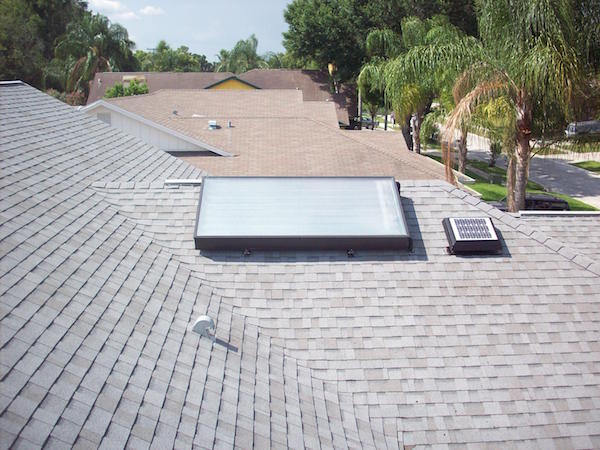
During the hot summer months, attic temperatures can reach up to 160 degrees, and even though passive cooling systems, such as ridge vents, can certainly disperse the heat, more efficient ventilation can be attained through the use of attic fans. Though these fans can certainly cool down your attic, they have a much broader function: whole house ventilation.
In the Attic
During the summer, your attic acts as a giant radiator, retaining heat which can end up ruining your stored possessions. This built-up heat can also spill over into the rest your home, causing your utility bills to steadily climb. In the winter, although the attic is certainly cooled off, moisture can eventually build up on the interior of the roof, creating havoc on your household structure (mildew, mold, peeling paint, decaying shingles, warped beams and floorboards). Since you don’t want to waste energy by heating or cooling your attic, the most efficient way to solve these problems is simple ventilation.
Even though natural ventilation can alleviate a lot of problems, attic fans can increase the air flow by pulling in air outside of your home and pushing it out through attic vents. Just as with central air conditioners, when the air in the attic hits a certain pre-set temperature, the fan will pull in cooler external air and push out the warmer air at a faster rate than passive ventilation systems that normally have to wait until the air gets so hot that it expands and slowly floats out through the vents on its own. For the winter months, these fans can also come with a humidistat that can pull moisture out of the air in order to prevent dampness.
Whole House Fan
These fans not only cool off your attic, they can be designed to ventilate your entire house. Central air can be very expensive and inefficient. Plus, if you live in an older house without central air, why spend all that money on new units and duct work when whole house fans cost less and can do the job for you. These fans are often installed in hallways and work on the same principle: by opening up your windows, they pull in the cooler outside air, move it quickly throughout your home, and release it through your attic, thereby cooling the entire house without all the extra costs. Of course it takes electricity to operate the fan, but it uses substantially less than central air; and if you want to avoid additional energy costs, you may want to look into the newest innovations in ventilation systems.
Solar Attic Fans
A solar attic fan is the newest invention in the heating and cooling industry. They are installed on the roofs of most homes and by collecting natural energy from the sun they can power a whole house fan with the same efficiency as electrical units. Since they run on natural resources, they cut down on utility costs, are more environmentally friendly, and don’t take up as much room in the home. They only operate when the sun is shining, but since removing excessive heat is usually the number one task of any attic fan, this is usually not a problem.
When it comes to ventilating your attic, always consult a professional. Though one fan is usually sufficient, it all depends on your personal priorities: cost, efficiency, and function. Do you want additional energy savings? Do you have a bigger attic to ventilate? Are you concerned about just the upstairs or the entire house? Are solar attic fans right for you? These questions can be better answered by consulting an experienced contractor who can impart expert advice and ensure quality installation.
 Increasing Attic Ventilation with Soffit Vents
Increasing Attic Ventilation with Soffit Vents  Whole House Humidifiers
Whole House Humidifiers  Roof Insulation Captures Escaping Energy
Roof Insulation Captures Escaping Energy  Choosing Green: Boilers and Radiator Heating Systems
Choosing Green: Boilers and Radiator Heating Systems  Ridge Vents Can Help Let Off Some Steam
Ridge Vents Can Help Let Off Some Steam 

I have an older home in South Florida.my central air was recently serviced and performing to guidelines. My attic fan quit working, and my air conditioner could no longer keep up to the 90 degree weather.with the air conditioner running all day it was taking up to midnight to get the temperature below 80. Installed a new attic fan and all is well again. I was amazed at the difference the attic fan makes. although I think some of the problem was due to old ductwork and hot air leaking down
through the Ducks.